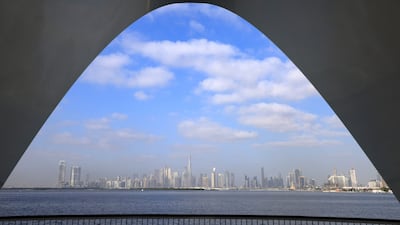Business activity in the UAE’s non-oil private sector economy grew at its strongest pace in four months.
The seasonally adjusted S&P Global purchasing managers’ index climbed to 54.3 in February, up from 54.1 in January, well above the neutral 50 mark that separates growth from contraction.
The latest reading signalled a "robust improvement" in the health of the sector, and is in line with the series long-run trend of 54.2, according to the survey.
More than a quarter of survey respondents said their output had increased since January, attributing this to new projects and rising client sales.
“The chief upside to the index was a faster rate of output growth … expectations towards future activity also picked up to a four-month high,” said David Owen, senior economist at S&P Global Market Intelligence.
“Supply chain conditions strengthened in February, shown by a marked reduction in delivery times that was the fastest since September 2019.”
Companies registered the sharpest reduction in lead times since September 2019 as supply chain conditions improved, with businesses raising their input purchases at a sharp and notably quicker pace.
The survey said the upswing in the index was the largest on record — in order to bolster output and plan for future work.
The UAE economy was projected to grow by 7.6 per cent last year, the highest in 11 years, driven by the oil and non-oil sectors, after expanding by 3.8 per cent in 2021, according to the UAE Central Bank.
The Arab world’s second-largest economy is projected to grow 3.9 per cent in 2023, according to the regulator.
First Abu Dhabi Bank forecasts hydrocarbon and non-hydrocarbon real gross domestic product growth of 5.4 per cent and 4.7 per cent, respectively, for the UAE economy this year.
Emirates NBD expects the UAE's GDP to grow by 3.9 per cent in 2023, well ahead of the World Bank’s global growth forecast of 1.7 per cent.
The UAE’s non-oil foreign trade hit a record Dh2.23 trillion ($607.1 billion) last year.
The Emirates wants to double the size of its economy by 2030 and is working towards signing 26 comprehensive economic partnership agreements as it seeks to attract more investment and diversify its economy.
It has already signed comprehensive economic partnership agreements with India, Indonesia and Israel, and is planning to conclude agreements with Turkey, Cambodia, Georgia and Vietnam.
Rising input demand in February contributed to a renewed rise in purchase prices, the sharpest uplift since July 2022, according to the S&P Global survey.
Looking ahead, non-oil companies signalled a stronger degree of confidence for the next 12 months in February, the highest since last October.
PMI data for Saudi Arabia and Egypt is scheduled to be released on March 5.


